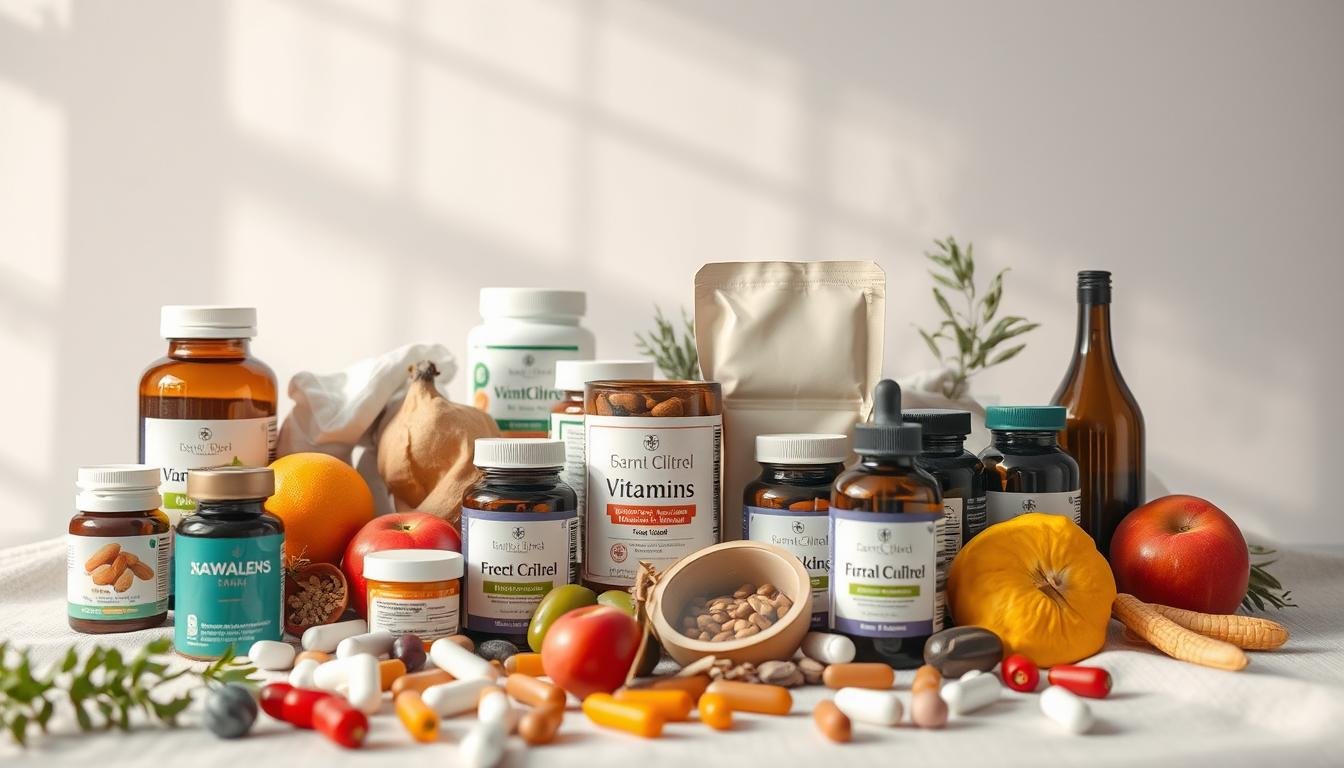Physical Address
304 North Cardinal St.
Dorchester Center, MA 02124
Physical Address
304 North Cardinal St.
Dorchester Center, MA 02124

Do you get all the nutrients your body needs from food alone? Daily supplements for women are key in today’s health plans. They offer focused nutrition that boosts overall health.
Women’s nutritional needs are complex and change often. Your body needs certain vitamins and minerals that might be hard to get from food. Daily supplements help fill these gaps.
Supplements can help with hormonal balance and boost energy. Finding the right mix of natural food and supplements is vital for your health.

Your body needs different nutrients at different times in your life. Women’s multivitamins are key to keeping you healthy. They help meet needs that are unique to women.
Hormonal changes affect what your body needs. From menstruation to pregnancy and menopause, your diet must change. This ensures your body gets the nutrients it needs to work well.
How your body absorbs nutrients can change too. Calcium, iron, and folate are extra important for women. They help keep bones strong, support reproductive health, and prevent deficiencies.
What you do every day affects your nutrition. Stress, exercise, diet, and age all play a part. Knowing this helps you choose the right multivitamins and supplements.
Knowing what your body needs helps you make better health choices. By focusing on the right nutrition, you can stay healthy at every stage of life.
Your body needs specific vitamins and minerals for her health. Women face unique nutritional challenges at different life stages. Knowing these essential nutrients helps keep you healthy and prevents health risks.
Calcium is key for women’s bone health. As you get older, your bones naturally lose density. So, getting 1000-1200 mg of calcium daily is important. Foods like dairy, leafy greens, and fortified items can help meet this need.
Iron is also vital for women’s health. Women often need more iron because of menstrual cycles and blood loss. Aim for 18 mg daily to keep red blood cells healthy. Good sources include lean meats, beans, and fortified cereals.
Vitamin D and folate are also important. Vitamin D boosts your immune system and bone health. Folate is key for reproductive health and preventing birth defects. You can get vitamin D from sunlight, fatty fish, and supplements.
Your nutritional needs are unique. Talking to a healthcare professional can help you find the right supplements for you. They can create a plan based on your health needs and lifestyle.
Quick recommendation: Our blog is filled with useful tips to help you succeed. If you are struggling to get rid of that bellly fat, take a look at JavaBurn.
Looking into nutritional supplements for women, we find some key options. Multivitamins are a top choice, filling in diet gaps with essential nutrients. They cater to women’s health needs at every life stage.
Omega-3 fatty acids are also popular for heart and brain health. They come from fish oil or algae and fight inflammation. Probiotics are another must, boosting digestive health and the immune system.
Herbal supplements like evening primrose oil and black cohosh are in demand. They help with hormonal balance and menopause symptoms. These natural options are great for reproductive health.
Choosing supplements should match your health goals and diet needs. Always talk to a healthcare professional. They can guide you to the best supplements for your health.
Scientific research is key to understanding women’s wellness supplements. Researchers have done a lot of studies to see how these supplements work. They look at what benefits and limits they have.
Clinical trials have given us important info on supplements for women. Vitamin D, calcium, and omega-3 fatty acids have shown good results. Supplements for bone health, hormonal balance, and reproductive wellness are also being studied a lot.
When looking at women’s wellness supplements, it’s important to check the research. Not all supplements work the same way for everyone. Some studies show benefits, while others show little effect on health.
Scientists are also looking into how supplements work with our bodies. They study how different compounds help women’s health at different times in life. It’s important to choose supplements based on your health goals and needs, with advice from doctors.
Research is ongoing to understand the link between nutrition, supplements, and women’s wellness. While research is helpful, always talk to a doctor before starting new supplements.
Choosing the right daily nutritional supplements for women can be tough. Everyone’s health needs are different. So, a one-size-fits-all approach won’t work for you.
Start by thinking about your health goals, what you eat, and how you feel now. A good supplement routine for her is all about finding the right fit for you.
Look for high-quality supplements that fill your nutritional gaps. Check for third-party certifications like NSF or USP. These ensure the product is safe and free from harmful stuff.
When you read labels, notice the serving sizes and ingredients. Not all supplements are the same. Women should focus on calcium, vitamin D, iron, and omega-3 fatty acids. Your age, lifestyle, and health conditions affect which supplements are best for you.
It’s a good idea to talk to a healthcare professional. They can help you pick the right supplements based on your health. They might even suggest blood tests to find out what you need.
Remember, supplements are meant to help, not replace, a healthy diet. Eat whole foods first. Use supplements as a boost for your health journey.
Exploring female health supplements can be confusing. Many women believe false information that affects their health. A big myth is that all supplements are safe and good for everyone.
Just because something is natural doesn’t mean it’s safe. Some supplements can react with medicines or cause side effects. For example, herbal supplements might seem safe but can affect prescription drugs or health conditions.
Some think more supplements mean better health. But, your body needs specific nutrients, and too many supplements can harm you. Some vitamins can build up to dangerous levels if taken too much.
Many believe supplements can replace eating well. While supplements can help, they’re not a complete solution. Foods give us complex nutrients that supplements can’t match. Eating a variety of foods is key to good health.
It’s important to talk to doctors before starting supplements. They can guide you on what supplements you need based on your health.
Quick recommendation: Our blog is filled with useful tips to help you succeed. If you are struggling to get rid of that bellly fat, take a look at JavaBurn.
When you take vitamin and mineral supplements, there are risks to know. Not every supplement is the same. Some can cause side effects or interact with your medicines. What works for one woman might not work for you.
Some supplements can cause mild to moderate reactions. You might feel nausea, stomach cramps, or constipation. Others might get headaches, skin rashes, or changes in appetite.
Drug interactions are a big worry with supplements. They can make your medicines less effective or even dangerous. For instance, calcium supplements might stop some antibiotics from working. Vitamin K can affect blood-thinning medicines.
Talking to your doctor before starting supplements is key. They can tell you about risks based on your health, medicines, and needs. Always tell them about all supplements and medicines you’re taking.
Too much of any supplement can be harmful. Vitamins A, D, E, and K can build up in your body. This can lead to toxicity if you take too much. Always follow the recommended doses and remember, more isn’t always better.
Your daily nutritional needs can change a lot based on your lifestyle. Different activities and life patterns affect which supplements are best for you.
For athletes and those who love fitness, protein, branched-chain amino acids, and vitamin D are key. They help with muscle recovery, improve performance, and keep bones strong. Vegetarians might need more iron, vitamin B12, and omega-3s because of diet gaps.
Stress also plays a big role in what supplements you need. People under a lot of stress might need ashwagandha, magnesium, and vitamin B complex. These help your nervous system and control cortisol levels. How well you sleep and your work schedule also affect your nutritional needs.
Women with tough jobs might need supplements for energy, immune health, and brain function. Multivitamins made for women can fill nutritional gaps from busy lives.
Knowing your lifestyle helps you pick the right supplements. This way, you can support your health and wellness goals better.
Nutrition experts say whole foods should be your main source of nutrients. Your body absorbs vitamins and minerals best when they come from natural foods. Women’s multivitamins can help, but they shouldn’t take the place of a balanced diet.
Some situations make supplements key for women. Dietary restrictions, pregnancy, intense exercise, or health issues might lead to nutrient gaps. For example, vegetarians often need more vitamin B12, and women in menopause might need calcium and vitamin D.
The idea of bioavailability is key to understanding how well nutrients are absorbed. Nutrients from whole foods are usually more easily absorbed than synthetic supplements. When picking women’s multivitamins, choose high-quality, food-based ones that match natural nutrient profiles.
While supplements are helpful, they shouldn’t replace a healthy diet. Talk to a healthcare professional to figure out your nutritional needs. They can help you create a supplement plan that supports your health and wellness.
Your nutritional needs change a lot as you get older. Young women in their 20s and 30s need supplements that help with reproductive health and energy. Folate and iron are key to avoid deficiencies during these years.
Women in their 40s and 50s face hormonal changes. Daily supplements for women can help manage these shifts. Calcium, vitamin D, and magnesium are important for bone health and preventing osteoporosis.
Older women focus on keeping their minds sharp and joints healthy. Omega-3 fatty acids, antioxidants, and vitamin B12 are vital. Talking to healthcare professionals can help find the right supplements for you.
Every age group has its own nutritional needs. Knowing these helps women choose the right supplements. This ensures they stay healthy and well throughout their lives.
Creating a balanced supplement routine for her is all about knowing your health needs. Start by figuring out what your body lacks nutritionally. Talk to a healthcare professional to check your diet and find out if you need more supplements.
First, do a health check. Keep track of what you eat, how you feel, and any health issues. This info helps you pick the right supplements for you. Remember, every woman is different, so a one-size-fits-all plan won’t work.
Slowly add new supplements to your routine. Start with important ones like vitamin D, calcium, and iron. Use a journal to note any changes in how you feel. Be ready to change your supplement plan as your health and life change.
Regular visits to your healthcare provider are important. Your body’s needs change with age, stress, and life stages. By staying on top of your health, you’ll find a plan that keeps you feeling great for the long term.
Quick recommendation: Our blog is filled with useful tips to help you succeed. If you are struggling to get rid of that bellly fat, take a look at JavaBurn.